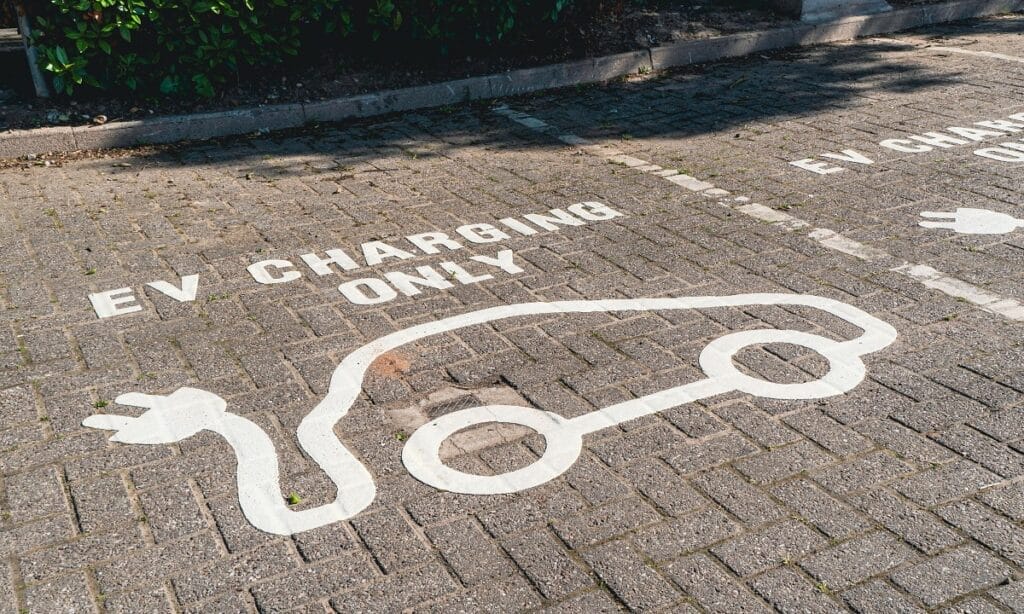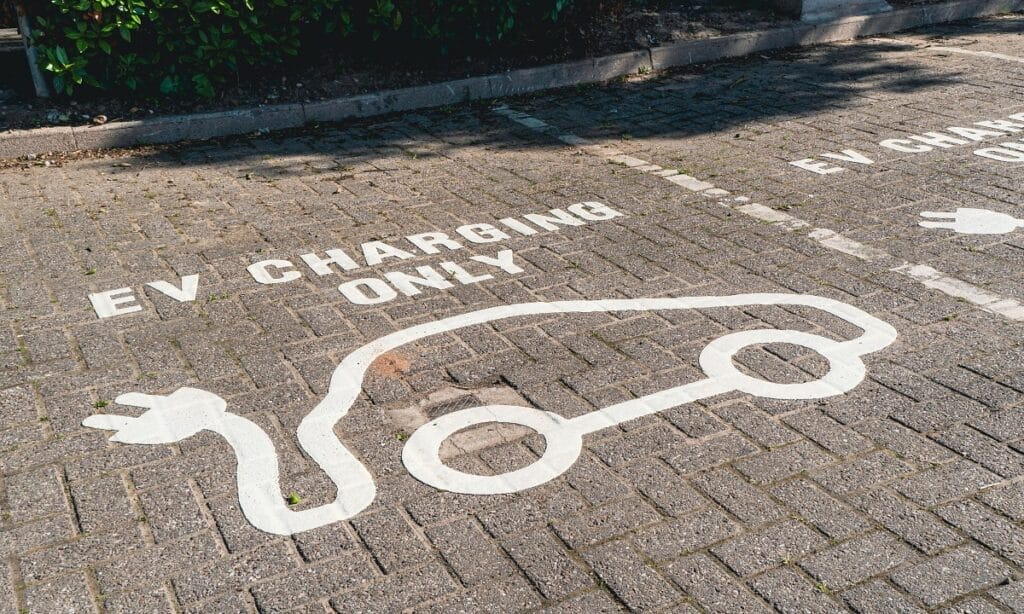This post originally appeared at https://www.badgerinstitute.org/wisconsins-78-65-million-charging-station-giveaway/
Another federal subsidy in a state indifferent to EVs
Wisconsin is handing out almost $79 million in federal funds to private businesses to build charging stations for electric vehicles at a make-or-break moment for both the EV and charging station industries.

And while the state Department of Transportation says recent turmoil in the charging industry isn’t affecting its plans for creating a statewide network, automobile buyers in Wisconsin continue to be among the least interested in EVs in the country.
To this point, state lawmakers from both parties have been receptive to EV developments — as long as the funding comes from federal taxpayers. The state hasn’t yet contributed tax funds for the network, nor is there a state tax credit for electric vehicles.
A Republican-controlled Legislature cleared the way to be eligible for the charging station funds, passing two bills in this past session. In none of the four votes to pass the bills were there more than two “nays.” Democratic Gov. Tony Evers, an ardent supporter of taxpayer support for the EV industry, signed the bills into law.
Republican state Sen. Howard Marklein, R-Spring Green, a driving force behind the effort, told the Badger Institute, “Several private sector businesses approached me because they wanted to participate in EV charging. State law stood in the way.”
Marklein pointed out the funding was coming from federal, not state, taxpayers. “I was more focused on allowing the private sector to re-sell electricity as a product without being regulated as a utility.”
Marklein, however, acknowledged that he was not sure whether or not EVs were “the way of the future” in Wisconsin.
How Wisconsin is spending its $78.65 million
The Wisconsin Electric Vehicle Infrastructure (WEVI) plan calls for building about 65 charging stations near highway interchanges, or one every 50 miles along federally designated “Alternative Fuel Corridors.” With any leftover funding, the state has discretion to build more.
Wisconsin currently has about 580 charging stations, heavily concentrated in population centers such as Madison and Milwaukee.
In general, federal funds will cover up to 80% of the cost of each station, and successful bidders will cover the rest. Proposals are expected to be selected based on a very detailed point system rewarding things such as low bids to build and the locations within the designated plan.
The Wisconsin DOT is “currently reviewing applications for all fuel corridors and will begin working towards issuing grant awards early this summer,” a spokesperson told the Badger Institute.
The DOT declined to say how many applications it had received, how many exceeded the minimum 20% private funding, or what the average cost of a station would be. Capital costs for a site that is “minimally compliant” with the federal requirements tend to run from $500,000 to $750,000, according to the charging company EVgo.
Opposition
Among the few who voted against the bills, state Sen. Steve Nass, R-Whitewater, told the Badger Institute that special interests spent more than 400 hours lobbying for “just another example of crony capitalism.”
“If the private sector actually believed these Level 3 chargers were a good and necessary advancement, they would be putting these chargers in at their own cost and competitively pricing the cost for vehicle owners to charge at each location,” Nass said.
Nass also questioned the touted environmental benefits underpinning the entire EV movement. “There is now ample evidence,” he said, “that EVs are not better for the environment when you analyze all aspects of procurement of the materials to build these vehicles and in the massive need for far greater electricity production, if these vehicles ever become the choice of most Americans.”
Rough road ahead
Just as $5 billion in public funding from the 2021 federal infrastructure law is being distributed for plans like Wisconsin’s, the future of charging station development is in question.
Elon Musk, who built his electric vehicle juggernaut Tesla on federal grants, subsidies and loans, announced late last month he was laying off nearly all of the 500 people who made up most of his charging station development team.
The team is responsible for more than 50,000 charging stations worldwide, more than 25,000 of them in the United States.
While he assured Americans in a Tweet less than two weeks later that he was committed to his charging program, several news sites this week reported that Musk fired the head of the program because she refused to fire more people in the charging station department.
Despite what it called a “make-or-break” moment for a national charging network, the Wall Street Journal reported the federal Joint Office of Transportation and Energy was committed to a network that “will continue to grow based on investments from the federal government, the private sector and states.”
“WisDOT is aware of staffing impacts at Tesla as a result of the recent announcement,” a department spokesperson told the Badger Institute. “We have not seen any impact to the [new charging-station] program.”
It’s not just charging initiatives that are facing hard times. After growth in every quarter of 2022 and 2023, national EV sales fell 7.3% in the first quarter of 2024 — this despite a tax credit of up to $7,500 for buyers and the billions of dollars in subsidies for manufacturers, led by Tesla.
The slowdown is “consistent with what we’re seeing in Wisconsin as well,” said Bill Sepic, founder and CEO of the Wisconsin Automobile & Truck Dealers Association. Speaking to the Badger Institute, he said he still expects EV sales to increase year-over-year, but he pointed to interest rates and cost concerns as potential reasons for the change.
Like most of the cold-weather Midwestern states, Wisconsin lags far behind the rest of the country in sales of electric vehicles. Through 2022, just 15,700, or 0.29%, of all 5.48 million registered vehicles in the state, were electric, the Badger Institute reported in March. Only Iowa, North Dakota and South Dakota had smaller EV fleets.
Electric vehicles, including plug-in hybrids, accounted for only 4% of Wisconsin light-vehicle sales through the first three-quarters of last year, less than half the 9% national average, according to a report from the Alliance for Automotive Innovation.
Nick Jarmusz, a regional spokesperson for AAA, told the Badger Institute that “consumers who do their research are likely to find that EV range is negatively impacted by cold weather.” Older buyers are particularly reticent to switch to electric, according to AAA’s national survey last year.
“Wisconsin is still a rural state,” Sepic said. “I think the penetration of electric vehicles is certainly greater in Madison and Milwaukee, and even in the Green Bay area — but outside of that, in small towns, there’s a fair distance between Point A and Point B.”
Of those who were undecided or unlikely to buy an EV in AAA’s survey, 56% cited a lack of charging stations, 59% worried about cost, 53% were concerned about range and 55% worried about the expense of replacing or repairing batteries.
The road ahead
Unless there is a change in presidential administration in November, expect taxpayer support for the entire electric vehicle industry to continue. The Biden administration this year issued new regulations in a drive to make half of new car and light-truck sales electric or hybrid by 2032. Those vehicles will need many more places to charge up.
It is clear from the dramatic slowdown in sales that at least some Americans are weighing the cost and the value of the current policies.
Critics have challenged the insistence of the Biden administration and the environmental movement, contending that converting all American cars and vans to electric would reduce global carbon emissions by less than 1%.
They also say that proponents consistently underplay the environmental damage done in manufacturing and operating electric vehicles, from the mining needed to manufacture batteries, and road damage and pollution from tire particles caused by the much heavier weight of electric vehicles.
Nass said the federal charging station subsidy and the legislative action taken to obtain it were not made with the public or the environment in mind.
“These bills were not written with the goal of meeting the needs of EV owners and the motoring public in general,” Nass said, “but to ensure that a handful of large businesses in Wisconsin receive most, if not all, of the $78 million.”
Robert VerBruggen is a fellow at the Manhattan Institute.
var gform;gform||(document.addEventListener(“gform_main_scripts_loaded”,function(){gform.scriptsLoaded=!0}),window.addEventListener(“DOMContentLoaded”,function(){gform.domLoaded=!0}),gform={domLoaded:!1,scriptsLoaded:!1,initializeOnLoaded:function(o){gform.domLoaded&&gform.scriptsLoaded?o():!gform.domLoaded&&gform.scriptsLoaded?window.addEventListener(“DOMContentLoaded”,o):document.addEventListener(“gform_main_scripts_loaded”,o)},hooks:{action:{},filter:{}},addAction:function(o,n,r,t){gform.addHook(“action”,o,n,r,t)},addFilter:function(o,n,r,t){gform.addHook(“filter”,o,n,r,t)},doAction:function(o){gform.doHook(“action”,o,arguments)},applyFilters:function(o){return gform.doHook(“filter”,o,arguments)},removeAction:function(o,n){gform.removeHook(“action”,o,n)},removeFilter:function(o,n,r){gform.removeHook(“filter”,o,n,r)},addHook:function(o,n,r,t,i){null==gform.hooks[o][n]&&(gform.hooks[o][n]=[]);var e=gform.hooks[o][n];null==i&&(i=n+”_”+e.length),gform.hooks[o][n].push({tag:i,callable:r,priority:t=null==t?10:t})},doHook:function(n,o,r){var t;if(r=Array.prototype.slice.call(r,1),null!=gform.hooks[n][o]&&((o=gform.hooks[n][o]).sort(function(o,n){return o.priority-n.priority}),o.forEach(function(o){“function”!=typeof(t=o.callable)&&(t=window[t]),”action”==n?t.apply(null,r):r[0]=t.apply(null,r)})),”filter”==n)return r[0]},removeHook:function(o,n,t,i){var r;null!=gform.hooks[o][n]&&(r=(r=gform.hooks[o][n]).filter(function(o,n,r){return!!(null!=i&&i!=o.tag||null!=t&&t!=o.priority)}),gform.hooks[o][n]=r)}});
Submit a comment
“*” indicates required fields
/* = 0;if(!is_postback){return;}var form_content = jQuery(this).contents().find(‘#gform_wrapper_21’);var is_confirmation = jQuery(this).contents().find(‘#gform_confirmation_wrapper_21’).length > 0;var is_redirect = contents.indexOf(‘gformRedirect(){‘) >= 0;var is_form = form_content.length > 0 && ! is_redirect && ! is_confirmation;var mt = parseInt(jQuery(‘html’).css(‘margin-top’), 10) + parseInt(jQuery(‘body’).css(‘margin-top’), 10) + 100;if(is_form){jQuery(‘#gform_wrapper_21’).html(form_content.html());if(form_content.hasClass(‘gform_validation_error’)){jQuery(‘#gform_wrapper_21’).addClass(‘gform_validation_error’);} else {jQuery(‘#gform_wrapper_21’).removeClass(‘gform_validation_error’);}setTimeout( function() { /* delay the scroll by 50 milliseconds to fix a bug in chrome */ jQuery(document).scrollTop(jQuery(‘#gform_wrapper_21’).offset().top – mt); }, 50 );if(window[‘gformInitDatepicker’]) {gformInitDatepicker();}if(window[‘gformInitPriceFields’]) {gformInitPriceFields();}var current_page = jQuery(‘#gform_source_page_number_21’).val();gformInitSpinner( 21, ‘https://e74sq7k37a8.exactdn.com/wp-content/plugins/gravityforms/images/spinner.svg’, true );jQuery(document).trigger(‘gform_page_loaded’, [21, current_page]);window[‘gf_submitting_21’] = false;}else if(!is_redirect){var confirmation_content = jQuery(this).contents().find(‘.GF_AJAX_POSTBACK’).html();if(!confirmation_content){confirmation_content = contents;}jQuery(‘#gform_wrapper_21’).replaceWith(confirmation_content);jQuery(document).scrollTop(jQuery(‘#gf_21’).offset().top – mt);jQuery(document).trigger(‘gform_confirmation_loaded’, [21]);window[‘gf_submitting_21’] = false;wp.a11y.speak(jQuery(‘#gform_confirmation_message_21’).text());}else{jQuery(‘#gform_21’).append(contents);if(window[‘gformRedirect’]) {gformRedirect();}}jQuery(document).trigger(“gform_pre_post_render”, [{ formId: “21”, currentPage: “current_page”, abort: function() { this.preventDefault(); } }]); if (event.defaultPrevented) { return; } const gformWrapperDiv = document.getElementById( “gform_wrapper_21” ); if ( gformWrapperDiv ) { const visibilitySpan = document.createElement( “span” ); visibilitySpan.id = “gform_visibility_test_21”; gformWrapperDiv.insertAdjacentElement( “afterend”, visibilitySpan ); } const visibilityTestDiv = document.getElementById( “gform_visibility_test_21” ); let postRenderFired = false; function triggerPostRender() { if ( postRenderFired ) { return; } postRenderFired = true; jQuery( document ).trigger( ‘gform_post_render’, [21, current_page] ); gform.utils.trigger( { event: ‘gform/postRender’, native: false, data: { formId: 21, currentPage: current_page } } ); if ( visibilityTestDiv ) { visibilityTestDiv.parentNode.removeChild( visibilityTestDiv ); } } function debounce( func, wait, immediate ) { var timeout; return function() { var context = this, args = arguments; var later = function() { timeout = null; if ( !immediate ) func.apply( context, args ); }; var callNow = immediate && !timeout; clearTimeout( timeout ); timeout = setTimeout( later, wait ); if ( callNow ) func.apply( context, args ); }; } const debouncedTriggerPostRender = debounce( function() { triggerPostRender(); }, 200 ); if ( visibilityTestDiv && visibilityTestDiv.offsetParent === null ) { const observer = new MutationObserver( ( mutations ) => { mutations.forEach( ( mutation ) => { if ( mutation.type === ‘attributes’ && visibilityTestDiv.offsetParent !== null ) { debouncedTriggerPostRender(); observer.disconnect(); } }); }); observer.observe( document.body, { attributes: true, childList: false, subtree: true, attributeFilter: [ ‘style’, ‘class’ ], }); } else { triggerPostRender(); } } );} );
/* ]]> */
The post Wisconsin’s $78.65 million charging-station giveaway appeared first on Badger Institute.
